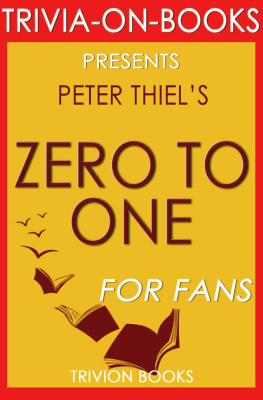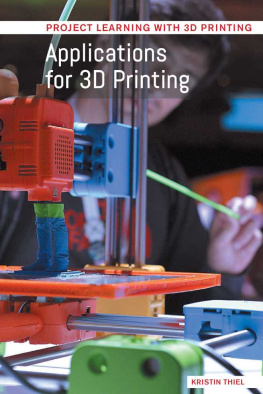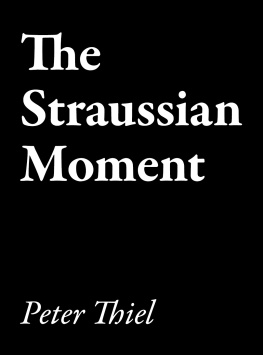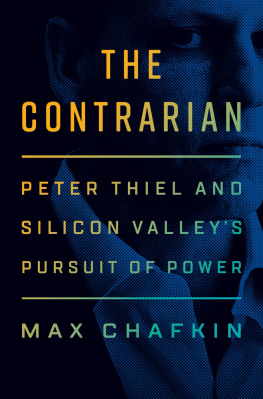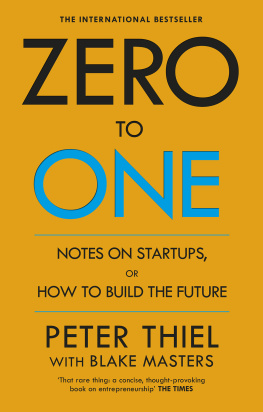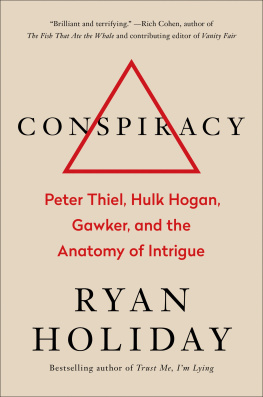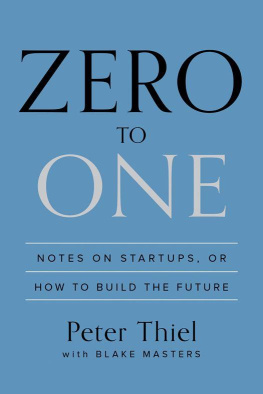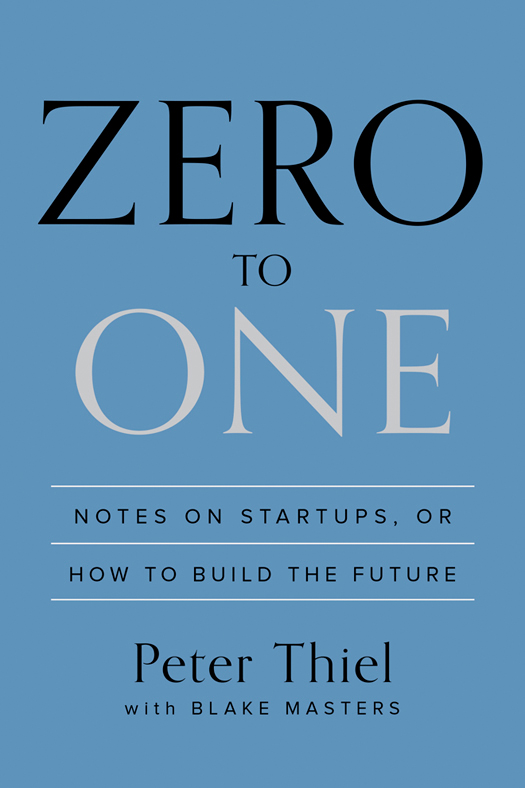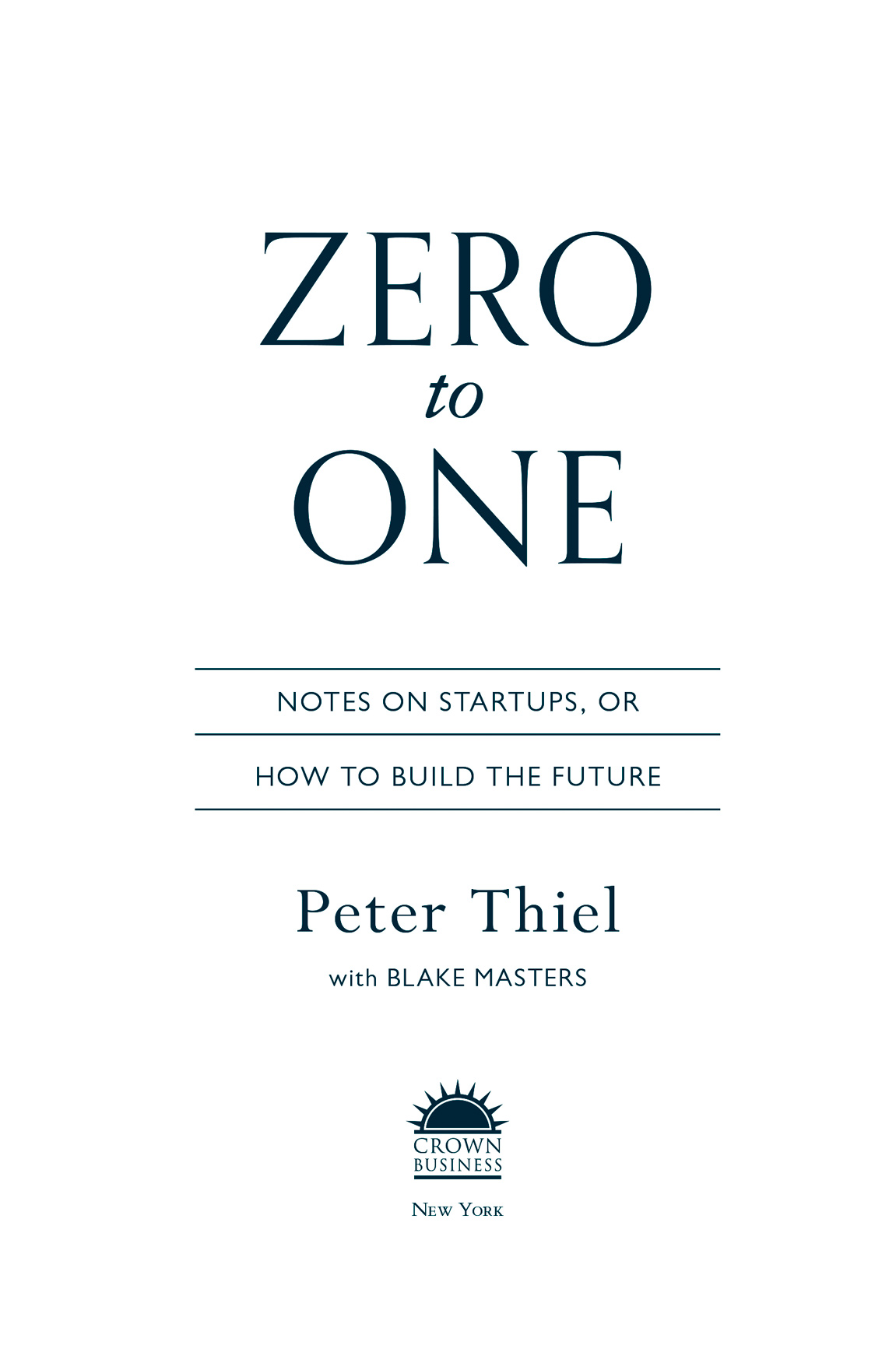Copyright 2014 by Peter Thiel
All rights reserved.
Published in the United States by Crown Business, an imprint of the Crown Publishing Group, a division of Random House LLC, a Penguin Random House Company, New York.
www.crownpublishing.com
CROWN BUSINESS is a trademark and CROWN and the Rising Sun colophon are registered trademarks of Random House LLC.
Crown Business books are available at special discounts for bulk purchases for sales promotions or corporate use. Special editions, including personalized covers, excerpts of existing books, or books with corporate logos, can be created in large quantities for special needs. For more information, contact Premium Sales at (212) 572-2232 or e-mail .
Library of Congress Cataloging-in-Publication Data
Thiel, Peter A.
Zero to one: notes on startups, or how to build the future / Peter Thiel with Blake Masters.
pages cm
1. New business enterprises. 2. New products. 3. Entrepreneurship. 4. Diffusion of innovations. I. Title.
HD62.5.T525 2014
685.11dc23 2014006653
Hardcover ISBN: 978-0-8041-3929-8
eBook ISBN: 978-0-8041-3930-4
Book design by Ralph Fowler / rlfdesign
Graphics by Rodrigo Corral Design
Illustrations by Matt Buck
Cover design by Michael Nagin
Additional credits appear , which constitutes a continuation of this copyright page.
v3.1
Contents
Preface
ZERO TO ONE
E VERY MOMENT IN BUSINESS happens only once. The next Bill Gates will not build an operating system. The next Larry Page or Sergey Brin wont make a search engine. And the next Mark Zuckerberg wont create a social network. If you are copying these guys, you arent learning from them.
Of course, its easier to copy a model than to make something new. Doing what we already know how to do takes the world from 1 to n, adding more of something familiar. But every time we create something new, we go from 0 to 1. The act of creation is singular, as is the moment of creation, and the result is something fresh and strange.
Unless they invest in the difficult task of creating new things, American companies will fail in the future no matter how big their profits remain today. What happens when weve gained everything to be had from fine-tuning the old lines of business that weve inherited? Unlikely as it sounds, the answer threatens to be far worse than the crisis of 2008. Todays best practices lead to dead ends; the best paths are new and untried.
In a world of gigantic administrative bureaucracies both public and private, searching for a new path might seem like hoping for a miracle. Actually, if American business is going to succeed, we are going to need hundreds, or even thousands, of miracles. This would be depressing but for one crucial fact: humans are distinguished from other species by our ability to work miracles. We call these miracles technology.
Technology is miraculous because it allows us to do more with less, ratcheting up our fundamental capabilities to a higher level. Other animals are instinctively driven to build things like dams or honeycombs, but we are the only ones that can invent new things and better ways of making them. Humans dont decide what to build by making choices from some cosmic catalog of options given in advance; instead, by creating new technologies, we rewrite the plan of the world. These are the kind of elementary truths we teach to second graders, but they are easy to forget in a world where so much of what we do is repeat what has been done before.
Zero to One is about how to build companies that create new things. It draws on everything Ive learned directly as a co-founder of PayPal and Palantir and then an investor in hundreds of startups, including Facebook and SpaceX. But while I have noticed many patterns, and I relate them here, this book offers no formula for success. The paradox of teaching entrepreneurship is that such a formula necessarily cannot exist; because every innovation is new and unique, no authority can prescribe in concrete terms how to be innovative. Indeed, the single most powerful pattern I have noticed is that successful people find value in unexpected places, and they do this by thinking about business from first principles instead of formulas.
This book stems from a course about startups that I taught at Stanford in 2012. College students can become extremely skilled at a few specialties, but many never learn what to do with those skills in the wider world. My primary goal in teaching the class was to help my students see beyond the tracks laid down by academic specialties to the broader future that is theirs to create. One of those students, Blake Masters, took detailed class notes, which circulated far beyond the campus, and in Zero to One I have worked with him to revise the notes for a wider audience. Theres no reason why the future should happen only at Stanford, or in college, or in Silicon Valley.
1
THE CHALLENGE OF THE FUTURE
W HENEVER I INTERVIEW someone for a job, I like to ask this question: What important truth do very few people agree with you on?
This question sounds easy because its straightforward. Actually, its very hard to answer. Its intellectually difficult because the knowledge that everyone is taught in school is by definition agreed upon. And its psychologically difficult because anyone trying to answer must say something she knows to be unpopular. Brilliant thinking is rare, but courage is in even shorter supply than genius.
Most commonly, I hear answers like the following:
Our educational system is broken and urgently needs to be fixed.
America is exceptional.
There is no God.
Those are bad answers. The first and the second statements might be true, but many people already agree with them. The third statement simply takes one side in a familiar debate. A good answer takes the following form: Most people believe in x, but the truth is the opposite of x . Ill give my own answer later in this chapter.
What does this contrarian question have to do with the future? In the most minimal sense, the future is simply the set of all moments yet to come. But what makes the future distinctive and important isnt that it hasnt happened yet, but rather that it will be a time when the world looks different from today. In this sense, if nothing about our society changes for the next 100 years, then the future is over 100 years away. If things change radically in the next decade, then the future is nearly at hand. No one can predict the future exactly, but we know two things: its going to be different, and it must be rooted in todays world. Most answers to the contrarian question are different ways of seeing the present; good answers are as close as we can come to looking into the future.
ZERO TO ONE: THE FUTURE OF PROGRESS
When we think about the future, we hope for a future of progress. That progress can take one of two forms. Horizontal or extensive progress means copying things that workgoing from 1 to n . Horizontal progress is easy to imagine because we already know what it looks like. Vertical or intensive progress means doing new thingsgoing from 0 to 1. Vertical progress is harder to imagine because it requires doing something nobody else has ever done. If you take one typewriter and build 100, you have made horizontal progress. If you have a typewriter and build a word processor, you have made vertical progress.








